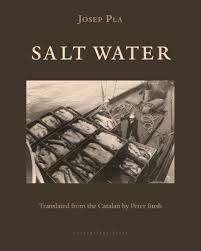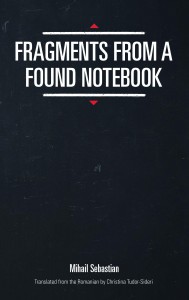Our final selections in excellent translations for the year of 2020 are fittingly full of thought. Throughout these texts, one finds the endless potential roadmaps that chart out from the individual mind’s interrogation and contemplation of their surroundings, and one’s own place within them. From a wandering mind, everything is a pool for endless reflection; a Catalan collection draws from the sea, a Romanian notebook is filled with musings and defiances of authorship, and a French diary novel tells the lives of many through the life of one.

Salt Water by Josep Pla, translated from the Catalan by Peter Bush, Archipelago Books, 2020
Review by Allison Braden, Editor-at-Large for Argentina
On a recent virtual happy hour, my friend described a weekend camping trip on a secluded barrier island off the coast of Georgia, in the southern US. My envy verged on rage as I listened from my living room, which doesn’t get enough natural light. He said that after he and his wife kayaked over and set up their tent (annoying a resident heron in the process), they had done absolutely nothing—not even read. They sat on the shore and watched the sea. It’s easy to believe how that could have been enough.
Josep Pla would understand. In Salt Water, translated from the Catalan by Peter Bush and released by Archipelago Books this month, Pla writes that “the mere presence of the sea is enough to sink into the deliquescent bliss of the contemplative life.” His curiosity courses through the book, a series of ten sketches that revolves around the coast of Pla’s native Catalonia: he describes shipwrecks, submarines, and harebrained sailing schemes. He relates stories from a salty, one-handed raconteur and imbues the rambling tales with strikingly lifelike texture. Though his plots unfold on or near the sea, human culture is ever present. Pla revels in detail, describing at length the joy of nearly black coffee on a marginally small boat: “That beverage makes an almost immediate impact: your mind projects itself onto the outside world, you are fascinated by everything around and a gleam comes to your eyes.” This book is a product of that fascinated, caffeinated gaze.
In the preface, Pla describes the stories as writings from his adolescence. In the translator’s note at the end of the book, however, Bush clarifies that they were written in the 1940s and hypothesizes that the preface was a canny attempt to evade censorship. He points out that Pla’s “articles containing veiled critiques of the dictatorship made him the most censored journalist in Spain.” Indeed, his biography offers helpful context for the conflicting claims that bookend the collection.
As a university student a century ago, Pla developed a clear, intelligible writing style and deployed it throughout his career as a journalist. He traveled widely across Europe as a foreign correspondent and served briefly as a member of Parliament for the Commonwealth of Catalonia, a short-lived assembly notable for its symbolic value. Over its eleven years in existence, the Commonwealth promoted Catalonia’s unity and identity, and evinced strong support for the Catalan language—Pla’s language. He became a chronicler of Spain’s tumultuous early twentieth-century history and spent multiple stints in exile. In the 1940s, he took to exploring his native coast and writing dispatches for Destino, a Burgos-based magazine at the forefront of the reemergence of Catalan-language culture. Throughout his peripatetic career, Pla never stopped writing: his complete works, compiled shortly before his death in 1981, stretch over thirty-eight volumes.
Sharp-tongued political critique is not the raison d’être of this volume, but it glides beneath the surface. These are stories of the sea, yes, but they’re also the stories of people living under dictatorship, and politics naturally contours their experience. Pla’s detailed descriptions—from the fishing villages and their colorful residents to his beloved coastal cuisine—are unmistakably authentic, but whether they’re true is less certain. The book is listed as literary fiction, but its blend of lived experience, journalistic observation, and fanciful style defies the fiction-nonfiction binary. The distinction becomes meaningless as soon as you immerse yourself in Pla’s well-drawn world.
Bush, who won the Ramon Llull Prize for Literary Translation for his work on Pla’s The Gray Notebook, demonstrates his award-winning expertise and decades of experience here. He conveys Pla’s winking humor and sharp observations in language that nods to the era without alienating modern readers (“The exchanges became so violent it almost came to fisticuffs. Those lads pulled the boat into the water and jumped in”). I marked several passages of sheer beauty, evocations of the sea that could almost make me forget my dim living room. Among them, for example, is Pla’s portrait of the roiling sea out beyond the breakwater: “The wind was raising a flurry of fine foam, like a mist of tiny glass particles, like luminous, ethereal white tulle.” Overall, the translation left me with the sense that if I sat across from Pla in a firelit tavern over a bream supper, his personality wouldn’t come as a surprise.
Of course, the joy of these stories is that I don’t have to track down the man himself (though I do wish I had the bream): his fireside tales are here, meandering and indulgent. As befits his subject’s constant inconstance, his poetic descriptions of the sea vary, attuned to the slightest shifts in weather and mood. As I read, his masterful evocation of place and atmosphere left no question as to where I was, but at times I caught myself wondering why I was there. Where were these stories going? Pla answers my question, in a way, when he describes what it means to consider the sea. “What are you contemplating? Nothing, in the end. Shapes that come and go, are made and unmade, are won and lost, transform and change,” he writes. “Everything at sea is fleeting, except the fascination generated by its resident instability.”

Fragments from a Found Notebook by Mihail Sebastian, translated from the Romanian by Christina Tudor-Sideri, Sublunary Editions, 2020
Review by MARGENTO, Editor-at-Large for Romania and Moldova
What happened to the “author”? This book will leave the reader wondering . . . And I do not mean that (only) in the sense of Barthes’s “death of the author” (which in this case became quite painfully literal), but in a manifold of political, biographical, and cultural ways. Who is Mihail Sebastian? Well, it’s indeed a pen-name, and one not totally strange to the English reader, if only for the Penguin Modern Classics edition of For Two Thousand Years or the Journal 1935–1944, which Philip Roth saw as belonging on “the same shelf as Anne Frank’s diary . . .”
A Jewish-Romanian writer, Sebastian had a complicated relationship with authorship even beyond having adopted a ”more palatable” name during the troubled decades around World War II. Somewhat similar to other internationally famous Romanians of the same period, such as Paul Celan or Benjamin Fondane (the latter killed at Auschwitz), his disguised—or even effaced—authorship involved a plethora of factors, ranging from multilayered nomadic identities to a deep convergence between aesthetics, ethics, and biography. As translator Christina Tudor-Sideri recounts in her rich, well researched, and page-turning introduction, Sebastian’s life and work interacted and replicated one another, resulting in the emergence of a certain mystique. His perhaps best-known novel, The Accident, is one of the most peremptory examples; starting with the fact that the first chapters were lost (or more likely stolen) in their manuscript state—which led to tormenting despair but also memorable reflections on writing and authorship—and ending with the writer’s own passing in a traffic accident, multiple ominous coincidences helped to engender such a mystique.
The potential parallels and relevance of a little book such as Fragments from a Found Notebook may prove even more diverse and far-reaching. The work is framed within the ancient trope of the found manuscript, another excellent opportunity for Sebastian to play ingeniously with conventions related to authorship, particularly as the speaker has an urgently confessional, passionate, fragmentary, and cross-genre voice, keeping with the style of the most diverse young stars of the same generation. One can in fact overhear reprises of the tone and diction of early Cioran or, at times, Ionesco, and perhaps most notably, those of the writer’s close friend and later-on world-class historian of religions, Mircea Eliade. A hardly known book by the latter recently made available to the English reader (Gaudeamus, reviewed in Asymptote) is living proof of that, and of the literary style and naked-existence (albeit sophisticated) kind of philosophy partly shared by the two, in spite of the huge political difference. Although back then a far-right sympathizer, Eliade, as argued by Christopher Bartholomew (translator of Gaudeamus and Eliade scholar), was paradoxically never an anti-Semite.
While sharing with the other stars of his generation the fragmentariness, urgency of tone, intellectual complexity, tormented inquisitiveness, and obsessive existential quests (and at times despair), Sebastian’s Fragments is also an impressive kaleidoscope of genres, forms, and angles. The diary smoothly metamorphoses into a lacunary novel, rendering introspection into confessional prose poems, scenes of the everyday into psychological, erotic, or social reflection, and memorable portrayals or place descriptions into casually sketched avant-la-lettre On the Road or road movie script notes . . .
Besides, Sebastian complicates further the (non) authorship trope. Since in Paris, the writing in the allegedly found notebook was in French, and what he therefore published was a “translation” of that manuscript. Under the pretense of lacking craftsmanship, he also occasionally provides, in parentheses, the “original” French. As one is reading the text in English, one reads the translation of a Romanian original, framed as the translation of a definitively lost hypothetical French original (which is nevertheless still there in parenthetical remainders, while the engulfing Romanian text has disappeared almost completely into the English translation).
The brilliant translator shrewdly allows this mirror game to go on untempered, apparently unworried about the nuances she normally strives commendably to render. Thus, the English and French seem at times to be conspiring against the vanishing, obscured Romanian, even in spite of the latter’s Latinate richness. “Greatness,” for instance, smoothly translates into the French “grandeur,” thus obliterating what was most likely not the Romanian “grandoare,” but “măreție,” a term free of the vanity of the former. At others times, however, French seems to help the spectral Romanian return from the dead to laugh behind the target language’s back (a phenomenon gently alluded to by the translator in her introduction when contrasting the emotionality of the Romanian language to the “seriousness” of English). “State of mind,” for example, fairly renders “état de grâce,” but the missing “stare de grație” (or even “stare de spirit”) gestures towards what is lost in translation, even as it echoes Sebastian’s unorthodox and uncompromisingly, untranslatably irreducible religiousness.
The latter is, of course, another intimate tie-in with the aforementioned luminary, Eliade, but is also prophetic of the diaries of other major twentieth-century vagabonds, mixing everyday notation, social critique, philosophical texts, and one-of-a-kind corporeally grounded spiritual practices and visions. One cannot help but think of Nestor Sanchez’s Manhattan Island Notebook—their common vagrant persona(e) at home in the margins, their combining of scathing lambasts against human hypocrisy and candid fraternal eschatology, the incredibly sharp application of prosaic details (sometimes in catalog form) to illuminate political and personal matters, and the recourse from the physical towards the regained cosmical. The latter occasions in both Sebastian and Sanchez a strong stress on the immediate (and arguably unmediated) physicality and immersiveness of experience:
The wind that blows, I welcome it on my face. Let it breach me like a tree in the steppe, let it strike me as it pleases and stop when it wills it! All the better if in the end I remain standing!
In an age in which remoteness and multiple mediation has become the “new normal,” the quote above turns out to have intriguingly foreshadowed current debates on what “digital existence”—to build upon Amanda Lagerkvist’s terms—is or is not. While we can still perhaps simultaneously or alternatively accept that, on the one hand, “we are essentially technical beings,” and, on the other, “a hug, a meal, or the wind cannot be completely digitalized,” the question persists . . . What happened to that human, that self-effacing elusive author/translator consistently trans-mediating him/herself into and beyond their writing, to the point of an irresistible “mystique” of coincidence between their (non)life and works? What, in the end, happened to Sebastian?

The Last Days of Ellis Island by Gaëlle Josse, translated from the French by Natasha Lehrer, World Editions, 2020
Review by Sarah Moore, Blog Editor
Gaëlle Josse’s intimate novel, winner of the European Union Prize for Literature and skillfully translated by Natasha Lehrer, is a powerful reflection on exile, immigration, and one’s sense of home. In November of 1954, as the immigration inspection station on Ellis Island prepares to close its doors permanently, John Mitchell, an officer of the Bureau, recounts his experience on the island through a series of diary entries, and as the text proceeds, it so becomes clear that his position and careful observances have given him a unique perspective of the station’s history—and of the lives that have passed through it. He gives us a complex—and often painful—insight into the bleak conditions and harsh poverty that have driven people to seek out a new home, while also reflecting upon his own career and the people he has worked with, culminating in a very personal reflection on choice, regret, and what makes life meaningful.
John bares his motive for telling this story from the beginning: he is haunted by his past and must liberate himself before his memories are lost.
I have no children, no parents, no family. Nothing but memories, deeply troubling ones. They are so disturbing it’s as if all the ghosts in my life awakened as soon as they realized I was leaving, and they will only find peace again once their stories have been told.
Rather than being a historical novel, The Last Days of Ellis Island is written as a confessional memoir. What continues to fascinate, however, is the narrator’s continued choice to remain on Ellis Island, markedly contrasting with the forced detention of its inmates. John has repeatedly refused higher-paid, more prestigious posts in order to remain in the solitude of this place; he too is an outsider. In this way, the novel is deeply psychological and moves beyond the wider context of the period to reveal the entrapment that can result from a certain way of living—with fears, with regret. In particular, John is haunted by two women—Liz, his beloved deceased wife, and Nella, a Sardinian immigrant who arrives on the Cincinnati ship. He is tormented by his encounter with Nella after he makes advances on her, and subsequently shifts between feelings of shame, regret, and desire.
Whilst John’s memories are the focus, this is not to say that the book overlooks the experience of those who arrive on Ellis Island. The benefit of this first-person narration is that individuals are named, and their circumstances and emotions are understood and transmitted with the subtlety of intimate experience. John compares his initial impression of the arriving ships with the Tower of Babel, the “Babel of desperation and dispersal, the place where everyone was returned to their native language.” John gradually comes to be familiar with some of the immigrants’ multiple languages and emphasises their individuality; in one of the memories he recounts, a German man who “must have been an itinerant harvest worker back home” comes to see him, points to a sharp paper knife, and speaks a few words in German. His interpreter translates: “He says you must never put away a knife like that, his mother always says that an angel passing by might get hurt.” John reflects on the episode:
In a few words he had summoned his mother and the beliefs of his native region, and a whole world that he would never see again was suddenly intensely present in this room. What would become of him in a few years?
Through this brief passage, the complexity of John’s character is immediate. He is not altogether likeable: he, as we all, occasionally resorts to assumption and disparaging remarks, and occasional abuses of power. Yet, his capacity for empathy is perpetually made evident. Here, he turns the paper knife to point down, but in other, more serious situations, he learns the dangers of becoming too close or too personal with individuals.
In The Last Days of Ellis Island, Josse masterfully creates a detailed world from what has been excluded. “Insider” and “outsider” are reversed, and the mainland of America is distant, unknown. Historical context is mentioned, but only rendered in detail through its consequences for John. The First World War, for example, is referenced only because the station is reorganised as a field of operations that John has to oversee:
Overseeing this surveillance system was my sole contribution to the world war that was at last coming to an end, my only connection with what was happening in the outside world.
From my vantage point on Ellis Island, I observed the continuing existence of America. The city, so near, so far away. For me, the island had become an outpost, a watchtower or rampart, with me standing sentinel against invasion.
This writing, in the vein of unadulterated confession, is charged with urgency from its opening lines, questioning what truly makes a home—ultimately it is people, names, and relationships that crowd John’s memories. His—and Josse’s—stories of Ellis Island are complex and conflicted, beautifully capable of capturing simultaneously the varied spectrums of courage, suffering, and hope.
*****
Read more on the Asymptote blog:

